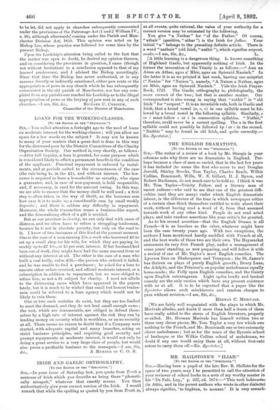IRISH AND GAELIC ORTHOGRAPHY.
[To THE EDITOR OF THE "SPECTATOR."]
STR,—In your issue of Saturday last, you quote from Truth a sentence of Irish which you describe as being there "phoneti- cally misspelt," whatever that exactly means. You then authoritatively give your correct version of the Irish. I would remark that while the spelling as quoted by you from Truth is,
at all events, quite rational, the value of your authority for a correct version may be estimated by the following.
You give "a Nathar " for "of the Father." Of course, " athair " (genitive," athar ") is the Irish for father. Your initial " n " belongs to the preceding definite article. There is a word " nathair" (old Irish, " nathir "), which signifies serpent, [A little learning is a dangerous thing. L. knows something of Highland Gaelic, but apparently nothing of Irish. In the former the invocation of the Trinity is as follows :—" Ann an Ainm an Athar, agus a' Mhic, agus an Spioraid Naoinah." In the latter it is as we printed it last week, barring one misprint (" Nanim " for "Nainm"), namely, "A Naium a Nathar, agns an Mhic, ages an Spioraid Naoimh." Vide the Irish Prayer- Book, 1721. The Gaelic orthography is, philologically, the more correct of the two; but that is another matter. Our correspondent is also wrong in saying that " nathir" is "old Irish" for "serpent." It is an invariable rule, both in Gaelic and Irish, that a broad vowel (a, o, u) in one syllable must be fol- lowed by a broad vowel in the following syllable. Similarly, e or i must follow e or i in consecutive syllables. " Nathir," therefore, could never be a correct spelling. The a in the first syllable could not possibly be followed by i or e in the second. "Naithir " may be found in old Irish, and quite correctly.— ED. Spectator.]


































 Previous page
Previous page